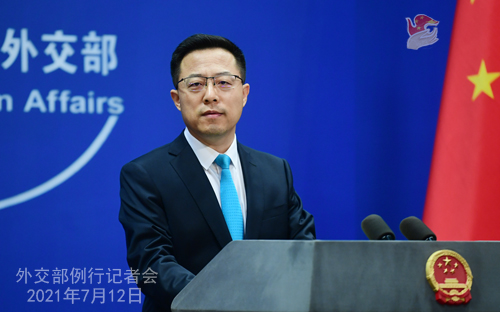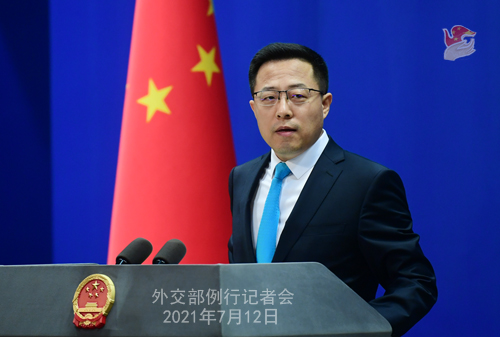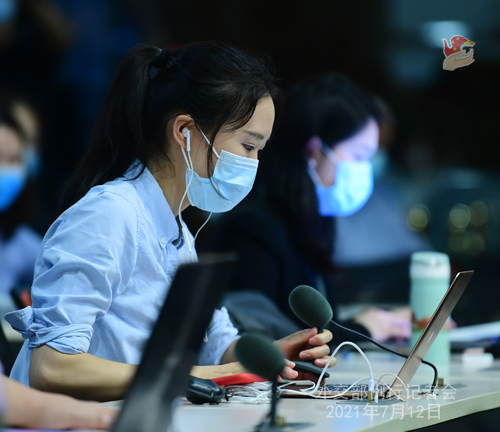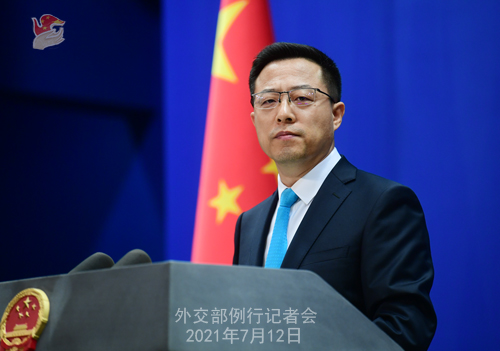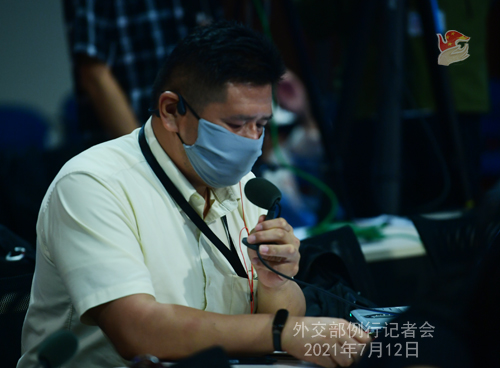| Foreign Ministry Spokesperson Zhao Lijian's Regular Press Conference on July 12, 2021 |
| 2021-07-12 19:39 |
|
CCTV: On July 12 Beijing time, US Secretary of State Antony Blinken released a press statement on the fifth anniversary of the so-called arbitral tribunal ruling on the South China Sea. He claims that the rules-based maritime order is under great threat in the South China Sea and accuses China of continuing to "coerce and intimidate Southeast Asian coastal states", threatening freedom of navigation in the South China Sea. He said that the arbitral tribunal delivered a decision firmly rejecting China's expansive South China Sea maritime claims as having no basis in international law, adding that China and the Philippines, "pursuant to their treaty obligations under the Law of the Sea Convention, are legally bound to comply with this decision". He also reaffirms that an armed attack on Philippine armed forces, public vessels, or aircraft in the South China Sea would invoke US mutual defense commitments under the US-Philippines Mutual Defense Treaty. He calls on China to abide by its obligations under international law, cease provocative behavior, and take steps to reassure the international community that it is committed to the rules-based maritime order. Does China have any comment on this? Zhao Lijian: The US statement disregards the historical merits and objective facts of the South China Sea issue, violates and distorts international law, and breaks the US government's long-held public commitment of not taking a position on the South China Sea sovereignty issue. It deliberately stokes disputes on territorial sovereignty and maritime rights and interests, sows discord among regional countries and undermines regional peace and stability. This is extremely irresponsible. China is strongly dissatisfied with and firmly opposed to the wrong act by the US side. I want to stress the following points: First, China's sovereignty, rights and interests in the South China Sea have been formed in the course of a long history. They are supported by abundant historical and legal basis and upheld by the Chinese government all along. No country raised any objection to this position until the 1970s. The US accusation that our maritime rights and interests in the South China Sea have no basis in international law totally runs counter to facts. Second, the South China Sea arbitration violated the principle of state consent and the arbitral tribunal exercised its jurisdiction ultra vires and rendered an award in disregard of law. The arbitration has major fallacies in fact-finding and application of law and violates UNCLOS and international law. The award of the arbitration is illegal, null and void. It is nothing more than a piece of waste paper. China does not accept or participate in the arbitration, nor does it accept or recognize the award. China's sovereignty and rights and interests over the South China Sea are not affected at all by the arbitration and China does not accept any claim or act based on it. Anyone with a discerning eye can easily see that the arbitration is a political farce which is initiated and manipulated by the US to smear and suppress China. The political agenda of the US to hype up the South China Sea issue by taking advantage of the 5th anniversary of the illegal award can't be more obvious. Third, China always advocates friendly negotiations and consultations to settle the South China Sea issue, treats our South China Sea neighbors as equals and exercises maximum restraint when safeguarding our sovereignty, rights and interests in the South China Sea. On the opposite, the US willfully sends large-scale advanced vessels and aircraft to the South China Sea for military reconnaissance and drills and illegally intruded into China's territorial waters and space and water and air space adjacent to islands and reefs. Since the beginning of this year, the US side has conducted close-in reconnaissance for nearly 2,000 times and over 20 large-scale military drills on the sea targeting China. What's more, the US abuses bilateral military agreements that smack of the Cold War to threaten to use force on China. This exposes its power politics logic and hegemonic practices. It is self-evident who is seeking coercion and intimidation and threatening freedom and security of navigation. Fourth, China firmly upholds and practices international rule of law. As an original contracting party of UNCLOS, China always correctly understands and earnestly implements the Convention, and uphold its authority and integrity with concrete actions. The US poses as a defender of international law and keeps referring to the Convention and making an issue out of it. Why doesn't it accede to the Convention first? It claims to uphold "rules-based international order", but refuses to execute the judgement and advisory opinion of the International Court of Justice and the resolution of the UN General Assembly. It is selective in applying international law and international order. The world's people see clearly the US' pragmatism, egoism and double standards. Fifth, the South China Sea is one of the busiest sea lanes in the world and the lifeline of China's maritime trade. Some 30% of global trade in goods and each year about 100,000 merchant vessels transit through the South China Sea. With the joint efforts of countries in the region including China, passage through the South China sea has been smooth and safe for a period of time, and not a single vessel has ever reported that its navigation is hindered or safety threatened in the South China Sea. The US allegation of "freedom of navigation" in the South China Sea threatened is simply untenable. Sixth, the South China Sea is the shared home for the countries in the region. It should not be a hunting field for the US to seek geopolitical self-interests. China and countries concerned have effectively managed differences through dialogue and consultation and continuously promoted practical cooperation. China and ASEAN countries fully and effectively implement the DOC and actively promote consultations on the "Code of Conduct in the South China Sea" with major progress. The US and other countries outside the region should respect the regional countries' efforts in maintaining peace and stability in the South China Sea. China urges the US to stop abusing international law, stop the use of force or the threat of force and stop making provocations in the South China Sea. It should abide by international law underpinned by the UN Charter, and respect China's sovereignty and rights and interests in the South China Sea instead of going further down the wrong path. China will continue to firmly defend its sovereignty, rights, interests and security in accordance with law, firmly protect the friendly, cooperative relations with regional countries, and firmly safeguard peace and stability in the South China Sea.
Xinhua News Agency: As COVID-19 continues to spread across the world, especially as the emergence of variants made prevention and containment more difficult, the WHO has repeatedly called on all countries to accelerate vaccine rollout to curb the large-scale transmission of the virus. Can you offer more details on how many doses China has provided outside the country? How have Chinese vaccines helped with the global response, especially in developing countries? Zhao Lijian: China has been actively implementing President Xi Jinping's pledge of making vaccines a global public good and upholding the concept of a community with a shared future for mankind to provide vaccines abroad in an open and inclusive manner. To date, we have provided more than 500 million doses and concentrates to over 100 countries and international organizations, one sixth of the total global output. Doses produced by Chinese companies for the WHO-led COVAX has rolled off the assembly line and will be delivered soon. In providing vaccines overseas, China always coordinates needs at home and abroad, and overcomes difficulties to actively respond to countries' requests for vaccine cooperation and launch cooperation with them. China has provided more doses to developing countries than anyone else and has vaccine cooperation partners all over the globe. President Xi Jinping said at the Global Health Summit that "China supports its vaccine companies in transferring technologies to other developing countries and carrying out joint production with them". With the support of the Chinese government, Chinese vaccine companies have started joint production in many countries including the UAE, Indonesia, Malaysia, Egypt, Brazil, Turkey, Pakistan and Mexico, with producing capacity exceeding 200 million doses. Political leaders of many countries have spoken highly of the important contribution Chinese vaccines have made to their local fight. Foreign nationals who have received the Chinese jabs have also voted in favor of the vaccines. As the pandemic continues to ebb and flow, the situation remains a grave challenge. China stands ready to work together in solidarity with all countries to contribute to an early full victory over the virus! AFP: The tech companies Foxconn and TSMC are buying 5 million Pfizer-BioNTech vaccine doses each from China's Fosun Pharma. This comes after Taiwan had trouble in securing a direct deal with Fosun. What's the foreign ministry's view on this arrangement? Zhao Lijian: This is not a question concerning foreign affairs. I would like to refer you to the competent authorities and relevant companies. I want to stress that we truly care about the welfare of our Taiwan compatriots and hope they can have early access to the direly-needed vaccine.
China Daily: On the sidelines of the 47th session of the UN Human Rights Council, China, Belarus, Russia and Venezuela jointly hosted a video session with the theme of "Human rights in the West: lack of international control and response to violations of human rights", which revealed the human rights problems of western countries and the hypocritical nature of their human rights policies. Could you elaborate on China's position? Zhao Lijian: Some Western countries like the US have been plagued by serious human rights problems such as racial discrimination, forced labor and gun violence, and committed crimes including genocide of indigenous communities, illegal military intervention and indiscriminate killing of civilians in other countries. Oddly, these countries, instead of conscientiously reflecting on and redressing their own problems, have been in the habit of lecturing others as if they were "defenders" of human rights, and even fabricating lies and rumors to vilify others. Facts have proved time and again that human rights is the last thing on their mind, and their real intention is to meddle in others' domestic affairs. The most important issue that consumers need to realize with drug ads is that they are just that - advertisements. Human rights are not the "patent" of some individual country, still less can they be defined only by Western ideology and values. The key to measuring the human rights cause of a country is whether its people are satisfied. Those Western countries have serious racial and human rights problems, and committed crimes in history. I wonder what gives them the confidence to boss others around and tell them off. They should forsake their hypocritical double standard and political manipulation, and get their house in order first. NHK: General Secretary of the Communist Party of China (CPC) Central Committee Xi Jinping exchanged congratulatory messages yesterday with Kim Jong Un, General Secretary of the Workers' Party of Korea (WPK) of the DPRK on the 60th anniversary of the signing of the China-DPRK Treaty of Friendship, Cooperation and Mutual Assistance. This year marks the time for extension of the treaty every 20 years. Can you confirm whether China has already extended the treaty with the DPRK side? Zhao Lijian: What I want to tell you is that, according the stipulations of the Treaty of Friendship, Cooperation and Mutual Assistance between the PRC and the DPRK, it remains in force unless agreement is reached on its amendment or termination. The Paper: The permanent missions of Canada and Australia in Geneva recently held a video conference with the theme of strengthening international cooperation to oppose the use of arbitrary detention in state-to-state relations, saying that arbitrary detention aimed at coercing other countries is unacceptable. Do you have a comment? Zhao Lijian: Speaking of arbitrary detention, the Meng Wanzhou incident is a textbook case in point. By detaining Ms. Meng, a Chinese citizen who hasn't violated any Canadian law, Canada is acting openly as an accomplice as the US works to suppress Huawei and other Chinese hi-tech companies. This is exactly arbitrary detention aimed at coercing other countries. The HSBC internal documents submitted recently by Ms. Meng to the Canadian court once again prove that the so-called fraud charges by the US against her is purely groundless fabrication out of thin air. This further exposed the nature of this incident, which is political persecution. This is not the time for empty slogans. Canada should clearly see its mistake, end the arbitrary detention of the Chinese national immediately and allow Ms. Meng to return to China safe and sound at an early date.
CNR: On July 10, Ethiopia's National Election Board announced the results of the parliamentary election held on June 21. The incumbent prime minister's Prosperity Party has won a majority in the federal parliament, putting it in a position to form cabinet. Do you have any comment? Zhao Lijian: China congratulates Ethiopia on its successful parliamentary election. Ethiopia is China's important strategic cooperative partner in Africa and a key participant in China-Africa cooperation under the BRI. China-Ethiopia cooperation, leading China-Africa cooperation, has delivered fruitful outcomes. With the concerted efforts from both sides, we believe our bilateral cooperation will surely achieve new progress and deliver more benefits to our peoples. Global Times: According to reports, the US tops the latest Bloomberg's COVID Resilience Ranking while China takes the No. 8 slot. Do you have any response? Zhao Lijian: Over the past few days, several of my colleagues and friends have asked me whether the Bloomberg report was misprinted. They also asked how the authoritative Bloomberg could have produced such a childish stunt. I see reports saying that in this so-called "Covid Resilience Ranking", in order to put the US at the top, Bloomberg even didn't scruple to remove such indicators as the number of confirmed cases and death toll, the most crucial factors in previous ranking. It also considered lockdown and entry and exit quarantine management policy as negative factors, which shows no respect for facts, science or life. As we Chinese often say, people have their own judgment and are sharp-eyed. The so-called ranking makes black look white, and white look black, and perhaps it will call the dead alive. They will only be shrugged off by people around the world and offer something for small talk. AFP: China's Olympic sail boat team has complained that they were put in the same hotel as regular tourists in Tokyo, exposing them to a higher risk of COVID-19 infection. Is China concerned about the precautions being taken by the Japanese Olympic authorities? Zhao Lijian: I'm not aware of that. We hope Japan will host a successful Olympic Games. We hope and trust that the Japanese side can make proper epidemic arrangement for all delegations including Chinese athletes.
China News Service: The 47th Session of the Human Rights Council deliberated on the Third Cycle of Universal Periodic Review on the human rights conditions in Australia. The representative of China criticized human rights problems in Australia. Russia, Syria and the UN Refugee Agency also expressed their concerns. Australian media commented that "the strongest public criticism came from China". What is your take on that? Zhao Lijian: China's criticism is the strongest because there is solid evidence for Australia's numerous human rights violations. The systemic discrimination and hate crimes targeting African Australians, Asian Australians and other minorities as well as Muslims and Indigenous people are very serious in Australia. Historically, Australia committed genocide and forced labor against the Indigenous people, which led to massacre and enslavement. The Indigenous population ranged from 750,000 to one million before colonization. But it fell to 74,000 in the 1930s. The Indigenous people were deprived cruelly of their languages and cultural rights. From 1910 to 1970, the Australian government adopted the White Australia policy and assimilation policy. It established English residential schools where the Indigenous students were forced to go so that they were separated from their families and their groups. In the schools, the students were banned from speaking their Indigenous languages, which brought 110 out of the 300-plus languages to the verge of extinction. Australia forced the adoption of nearly 100,000 Indigenous children in white families or specialized institutions to cut their language and cultural ties with their original groups, making them a "stolen generation". Even till this day, the Indigenous Australians are living in dire situations. From 2018, the average unemployment rate of the Indigenous people is around 20%, nearly four times that of the national average. The average life expectancy of Indigenous Australians is 7.8 to 8.6 years shorter than that of non-Indigenous people. The infant and child mortality rate is twice that of other groups. By March 2020, Indigenous people account for nearly 30% of the incarcerated in Australia, far higher than the proportion of Indigenous population. In addition, Australia set up off-shore detention centers in third countries, where a large number of immigrants, refugees and asylum seekers are forcibly detained for a long time or indefinitely with their basic human rights gravely violated. Australian troops committed serious war crimes in their overseas military operations in Afghanistan and other places. But they get away unpunished. While turning a blind eye to its own human rights abuses, Australia points fingers at other countries' human rights conditions based on lies and rumors. This fully exposes Australia's hypocrisy on human rights issues. The Australian side should stop attacking and smearing other countries under the human rights pretext, do some soul-searching and resolve its own human rights issues well.
|
| |||||||||||||||
|
|||||||||||||||


